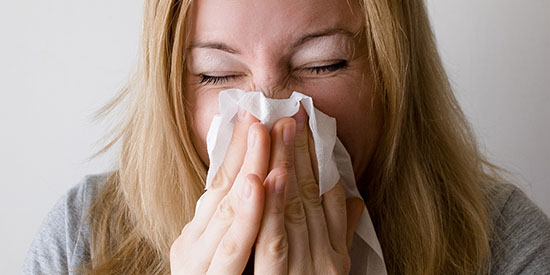Triple usual flu numbers sparks warning from infectious disease expert
The flu season has started early this year, and a Geelong infectious disease expert has advised there are three critical ways to protect yourself - get vaccinated, steer clear of sick people, and wash your hands.
Associate Professor Deb Friedman is a senior lecturer in Deakin's Medical School and works in Barwon Health's Department of Infectious Diseases. She said there had already been more than 5000 reported flu cases in Victoria so far this year, an uncharacteristically large number three times the usual figures, which could signal a tough winter on its way.
"Typically there are about 11,000 to 15,000 flu cases reported in Victoria per year. Although in 2017, which was a particularly bad year, there were 48,000 cases," she said.
"It is very difficult to predict at this early stage how bad the 2019 season will be. But what is certain is that the season has started very early this year."
The flu season usually runs from April to October over the colder months. Associate Professor Friedman said the particular strain or strains of flu circulating during this period was the major predictor of a severe flu season or flu pandemic.
"A new strain to which the community has poor immunity will cause a severe season with more cases," she said.
"The flu is an acute contagious viral infection caused by the influenza virus. The hallmark symptoms include fever, chills, and muscle ache, which may be accompanied by respiratory symptoms such as cough, and gastrointestinal symptoms such as vomiting and diarrhoea."
Associate Professor Friedman said the virus was much more severe than a common cold.
"In cases of the common cold, fever is far less common, and sore throat and runny nose are common," she said.
"People with the flu are significantly more unwell and are at risk of many complications which do not occur in the common cold. The very young, the elderly, pregnant women, those with reduced immunity, and those with underlying medical conditions such as heart or lung disease or obesity, are the most at risk."
Associate Professor Friedman said there were three important ways to protect yourself from the virus.
"The three best ways are annual vaccination, separating oneself by more than one metre from sick people, and good hand hygiene," she said.
"Washing hands is crucial, as we spread flu either by inhaling infectious droplets when a person coughs or sneezes, or via our hands touching surfaces or other hands which may transmit flu."
Associate Professor Friedman said the annual flu vaccine, typically available from mid-April through GPs and some pharmacies, was developed to cover circulating strains in Australia and in the northern hemisphere.
"That means it can vary from year to year, and only covers a certain number of the most common strains. Once vaccinated, individuals develop antibodies to the strains in the vaccine and this reduces their chances of developing influenza," she said.

